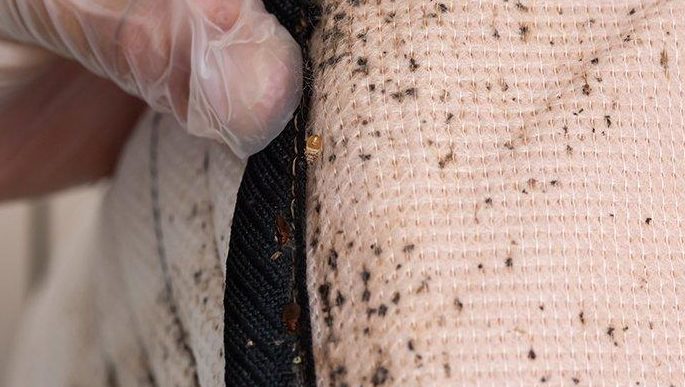Just the idea of bed bugs can leave us cowering in our beds. Unfortunately, hiding under the covers isn’t much of a defense. In fact, it’s probably the worst place for us. Those blood-sucking pests are most often found in bedrooms. Heck – it’s how they got their name.
Bed bugs tend to be found in our bedrooms because that’s where they can find their favorite food source – us. And it really doesn’t matter much how clean you keep your room. A tidy room can help you spot bed bugs if your searching for them, but it doesn’t do much to prevent them from invading in the first place.
Where do Bed Bugs Hide?
Bed bugs are small oval-shaped insects. Roughly the size of an apple seed and brownish-red in color. They are only about the width of a credit card, so they can easily slip into some pretty tight spaces.
You’re most likely to find bed bugs hiding in small groups on mattresses, in box springs, and in and around bed frames. As a general rule, these parasites try to stay as close to their host as possible so beds are a perfect hiding place and feeding zone. Particularly since their prey – us – will be asleep and off our guard.
How Can You Know if Your Bed has Bed Bugs?
There are some sure signs that your bed has become home to bed bugs. Some are more obvious than others, but all point in the same direction – bed bugs.
Here are a few tell-tale signs to watch for:
- Bite marks, rashes, or itchy areas on your body
- Blood stains on sheets or pillow cases
- Dark spots on mattress, sheets or pillow cases – in other words bed bug excrement
- A musty odor
- Bed bugs – living or dead
Getting Rid of Bed Bugs in Your Mattress
If you find bed bugs in your mattress or bed spring you may think that your only option is to throw the whole kit and caboodle away. That may seem to be the easiest and surest option. But replacing your mattress and bed spring can be expensive.
But there are some do-it-yourself tips that you can follow to help save your mattress and bed spring. Of course, once you have bed bugs in your home you’ll want to bring in a professional exterminator to deal with the infestation. But there are ways to save your bed and your bedding.
Keep in mind these DIY methods take time, and you may need to repeat the processes several times to fully clear out the bugs.
- Launder Your Linens – The first thing to do is to strip your bed and wash all of your linens and bed clothes. This includes pillows, pillow cases, sheets, comforters and duvet. Roll everything up and put it in a trash bag for transport to your laundry room or local laundromat. This will help contain any bed bugs lurking in your linen.
Wash all of your bed linens in hot water. Put everything through a hot dryer. The heat should kill any live bed bugs as well as any eggs. - Vacuum – With your bedding in the wash and out of the way it’s time to vacuum your bedroom. Don’t use a brush attachment as the bed bugs and cling to the bristles. Instead use the hose fixture.
You want to vacuum the room thoroughly. You also want to vacuum the mattress and bed spring themselves, paying close attention to any crevices or folds where bed bugs might be hiding. Be thorough here and remember you may have to repeat this step several times.
Dump the contents of your vacuum in an outside garbage and clean out the vacuum’s container to avoid bring bed bugs back inside. - Disassemble Your Bed Frame – If possible take your bed frame apart. Bed bugs can hide in the smallest of places so you want to get in as deeply as you can. Check for any signs of bed bugs and clean out any cracks and crevices.
- Steam Your Mattress – Steam cleaning can kill both bed bugs and their eggs. However, it is important that you use a steamer that can reach a temperature of at least 120 degrees. You may find it necessary to rent an industrial steamer to complete this step. And again, this step may need to be repeated several times to full eliminate all of the bed bugs.
- Put Bed Bug Encasements on Your Mattress and Bed Spring – Finally, put bed bug encasements on both your mattress and bed spring. These specialized covers are designed to make it impossible for bed bugs to escape. Any bed bugs you may have missed will be trapped. Eventually they (and their eggs) will die off. For this step to be effective you should leave the encasement on for at least a year.
Call in the Professionals
If you find bed bugs in your bed it’s a safe bet these pests have camps throughout your home. At this point the best option is to call in a professional bed bug inspection and removal service. Together you can devise a plan of attack that will eliminate bed bugs from your home so you can get that good night’s sleep you’ve been missing.
Published by Scott Palatnik
If you believe you’ve brought bed bugs into your home or office, give us a call, we can help!
Now with 2 locations. On Long Island @ 516-619-6149, or in NYC @ 212-299-9186

